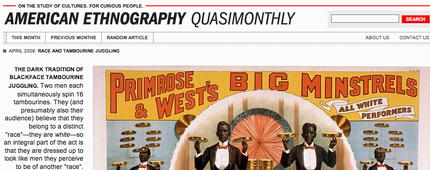Anthropologist Martin Høyem has launched the e-zine “American Ethnography”, an “internet glossy on the study of cultures”:
We cover ethnography that relates to anything we would call America. We aim to present the tradition and practice of ethnography to people who didn’t know they could be intrigued by ethnography. The goal is to help increase the interest in how we all try to understand unfamiliar cultures. This, we think, could do the world good.
As he writes to me in an email, “it’s pretty new, so there isn’t a lot of material there yet, and most of what is there is old public domain texts (previously not freely available to the general public).” Most of the texts were previously published in the journal American Anthropologist.
Around twelve articles are online already, including portraits of some famous anthropologists and texts about the peyote-cult – a cactus that was eaten in rituals of native Indians. The most recent issue contains articles about race and tambourine juggling. Looks interesting!
Høyem has previously written a thesis about American Lowrider Culture called I want my car to look like a whore. Lowriding and poetics of outlaw aesthetics, see also my post about the thesis: When Norwegians do business in Brazil, Lowrider Culture and 9 more anthropology theses.
Høyem is currently working at Pacific Ethnography – anthropology and design
UPDATE: The discussion about American Ethnography and copyright issues is continuing over at Savage Minds, see American Ethnography, the AAA, and the Public Domain


VERY pretty…. I just hope the AAA doesn’t decide to sue him for copyright infringement…
Kudos to the American Anthropological Association and University of California Press (who holds the copyright to AAA’s journals): They have placed those texts in the public domain. I guess that’s one of my favorite features of science, the relatively free access to research results. As you can see, though, all those texts we have chosen for re-publication on American Ethnography are pre-1964, and thus some people might find our overall collection of articles so far a little … old. It’s just that some of that old stuff is too good to not be recycled! One of our goals is to make this type of material available in more than the physical sense of the word—to see if it is possible to also make it look more interesting and attractive.
And AAA wouldn’t sue anybody for trying to make them look interesting and attractive, would they! 🙂
We’ll continue excavate the archives, but watch out for more recently produced stuff in upcoming issues. There are some great new things just around the corner.
Where did they put those in the public domain? And did they license them for redistribution?
I found out today that University of California Press does not any more handle AAA’s publications (Blackwell Publishing does), but here’s what AAA says on their own web pages:
“AAA article content published before 1964 is in the public domain and may be used and copied without permission. The AAA asks only that you include a complete reference to the original publication and a link to AnthroSource.”
http://www.aaanet.org/publications/permissions.cfm
This is very good news, thanks Martin. I have been planning on “rendering” PDF files into HTML, derived from AAA publications, on the indigenous peoples of the Caribbean for quite some time, most if not all of which was published pre-1960s. Given the extreme nature of American copyright laws, with items not to be released into the public domain for many decades after the death of the author, I gave up hope, thinking it could cause problems if I went ahead.
Martin —
Thanks for that link, which I wasn’t aware of. That’s good news indeed.
Maximilian:
I am hoping that when AAA writes that the texts are public domain they don’t mean “public domain, but …”! As in “you can use it as you please, but only if you are going to use it in a pamphlet which you will not show to anyone.” I am hoping that “public domain” means public domain, period, but perhaps that is just my naive and wishful thinking.
My simple desire was that it would work out to the better for everybody (perhaps particularly in these times) if more people have access to and take an interest in material concerning cultural relativism. Using those texts on American Ethnography, I figured, would be good for anthropologists, as well as for the AAA … nay the world. 🙂